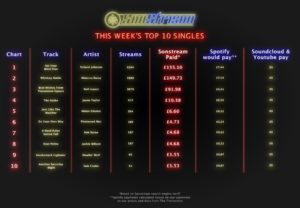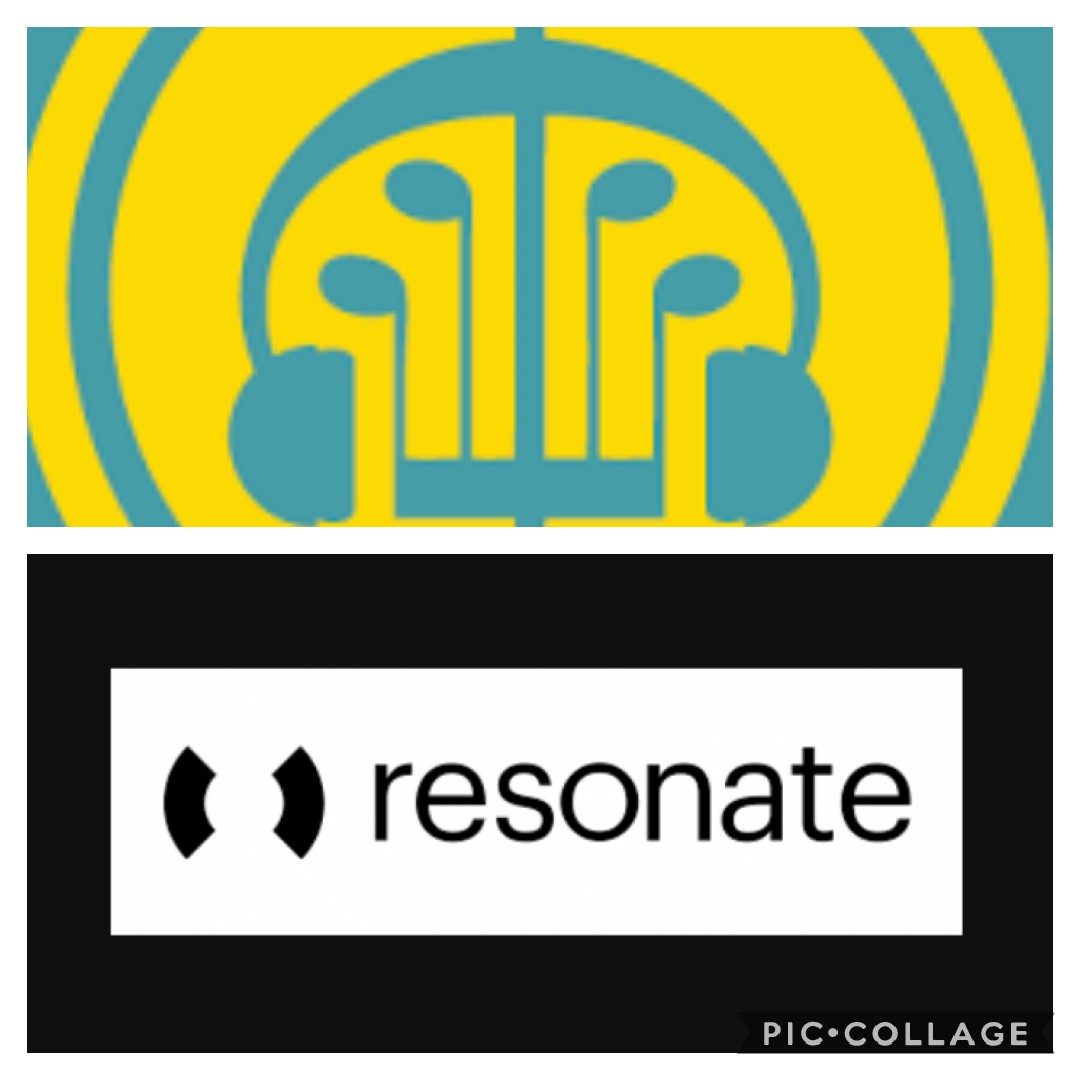Following the out of touch comments of Spotify CEO Daniel Ek that appeared to refer to artists as “content creators” and demanded “continuous engagement”, my piece a few weeks ago looked at why the current Spotify model doesn’t work for most artists and is unsustainable as a business model. It’s an issue thrown into even more sharp contrast by the potential lack of full capacity shows well into 2021, which makes the financial situation for artists dire.
Last year I put forward the idea that we desperately needed more viable and fairer alternative platforms to Spotify, now in a series of features I am going to investigate some of the other platforms for delivering music and sustaining artists and labels that are offering a different route for those who think the Spotify model is failing them. First I will look at ethical streaming platforms like Sonstream and Resonate, that aim to provide better return for the streams and a more sustainable system.
Founded in Stoke on Trent in 2010, Sonstream is a streaming start up offering an alternative user-centric and musician focussed model compared to Spotify. With a basic set up and a pretty simple site and an app still in beta development, Iain Hutton gives us a behind the scenes insight into Sonstream, one of the more ethical streaming and digital platforms along with Resonate and Bandcamp.
“Sonstream was born out of SONS Records, a small indie label based in the industrial city of Stoke-On-Trent.” He explains “The label charted in the top 10 indie charts (including a number one) on numerous occasions during the period that saw the transition from CD sales to downloads – a period that saw the beginning squeeze on unit price and unit based profits by the internet’s emerging giants on the waning, arrogant and grossly out of step Record Industry bosses. Seb Clarke soon recognised (around 2006/7) that even downloads would be superseded by streams if anyone could figure out a way to monetise the concept and established the basics of the Sonstream concept in 2008. Sonstream was officially set up in 2010.
But how does the Sonstream model differ from the big streamers? “Sonstream is unit-centric. It is “Pay-per-Play” streaming. No ads, No subscriptions, No algorithms. The service offer singles and album streams. Albums cost 10p to stream in their entirety (so the unit price is dependent on the number of tracks on the Album) where as singles come in three different tariffs, the most being 3.3p per stream, the cheapest being 1.5p per stream. By proxy of the model; unsigned music artists receive 2.5p for every pay of their tracks… “
With Spotify every ten pound monthly premium subscription goes into one pot and is divvied up often to the advantage of major label artists, Sonstream is looking at a user centric model that rewards the streams artists achieve and for fans the songs you listen to: “The model is designed to provide full accountability by providing a pay-per-trail (pardon the pun) which ensures the users money goes directly to the rights-holder without any pesky algorithms stacking arbitrary stream value towards the major artists. This eliminates the blatantly corrupt process of divvying up the pot, a factor which is inseparable from the subscription model (even with UCPS).”
The figures they have published of streams and pay outs in the first few weeks are impressive in comparison to Spotify:

The recent comments of Spotify CEO Daniel Ek illustrated how removed he is from the creative process and artists, demanding more and more “content” for less and less. Hutton agrees: “Daniel Ek’s comments show just how out of touch, and unconscionably greedy he is… It demonstrates that he knows nothing of the shear hard graft, skill, expertise and cost it takes to produce great music – the very thing that is providing him with custom, and millions in advertising and subscription revenue; it shows that the man is as profoundly ignorant as he is arrogant; he is a man without an ounce of creative problem solving, instead eager to simply point the finger and pass the buck. It also reveals an even more cynical truth; In reality, for services such as Spotify, the “product” isn’t the music, it is in fact the platform itself – the music is simply a loss leader there to sell platforms advertising packages and hope to pick up some subscribers along the way. The model has remained unchanged for a decade because there are too many vested interests: the overwhelming majority of artists make virtually nothing from streaming but Daniel Ek at Spotify, and record company bosses like Lucian Grange, Rob Stringer and Stephen Cooper are all getting handsomely paid thank you very much. Everyone needs to face the fact that neither the Streaming Industry or the Record Company hierarchy have any intention or reason to change anything.”
He explains the inspiration behind the platform “SONS Records boss Seb Clarke, the creator of Sonstream, is actually a writer, singer and producer himself – and so created the Sonstream model from the perspective of both an artist and a music lover. And so, in contrast to all the other streaming services, the product at Sonstream is the music, and only the music – just like how record shops used to be… The Sonstream model prioritises the artists, and compensates them very generously. Spotify holds the reigns on this industry for now. They are willing to pay Joe Rogan 100 million for exclusivity because it will sell advertising. The existing commodification of music, which is the exploitation of the whole music community in truth, is reaching an inevitable tipping point.”
With the success of a streaming platform often being made or broken on the quality of its app and with currently quite a basic website set up, I wondered where Sonstream is in the process developing its own application? “Being the product of a disenfranchised back street indie label in a run down pottery town, Sonstream does not have the Scrooge McDuck levels of cash that the major services have… So up until now we’ve had to do it all on the cheap (relatively speaking)… We needed to release the current version of the website to prove the concept; that’s been successful enough for us to raise the investment to develop some major improvements to the platform and roll out the IOS and Android Apps in early September. These are priorities for us going forward.
Taking on a dominant tech giant like Spotify with the full backing of the major labels won’t be easy but Sonstream have plucky aims, to carve out their own niche in the streaming market: “We have no illusions as to the insurmountable task of toppling such an entrenched industry status quo, but we hope that if we make enough noise, then just maybe we can change the conversation as to how music is monetised; and just maybe we can restore some sovereignty to the artists and the fans. It’s an uphill battle, but the SONS Records story has always been that of the underdog. Our studio has leaks in the roof, cracks in the walls big enough for your hand (from the city coal mining past) and DIY acoustic sound treatment made from off cuts of wood out of a timber yards skip; it does however have a cracking 20’ x 14’ neon sign. Our successes over the years have been built out of passion and poverty – in that order.”
But who have they got signed up so far? “One of our artists at SONS Records – Neil Isaacs, recently quoted Chairman Mao in his track ‘Best Wishes From Tiananmen Square’. ‘A revolution is not a dinner party.’ This is no exception.”
“Our main distributer/supplier at this time is State51 but we are work to acquire the licences to all the music can – and hope to have some important news to announce soon. But our big USP is also the You-Release model. All our new label releases [SONS Records] are now exclusive to Sonstream ‘You-Release’ in order to prove that fans will be willing to follow the music they love and are happy to pay in a radically different way, to anything SONS Records / State51 are now releasing exclusively on our platform, one particular being Minerva Daisy, a Manchester singer songwriter who in a week have earned more on Sonstream than in years on Spotify. This week saw a Roland Johnson (godfather of Illinois Soul) track put out on Sonstream’s You-Release service by Northern Soul label MD Records. We are definitely gaining support by the week.”
The artist Jayne Taylor talks positively about her experience with using Sonsphere platform: “My latest stuff is only on Sonstream and I will take all my music off all the other services when i get chance – there is literally no point in leaving the tracks there. My dream is to become a professional artist and in that aim Sonstream has been wonderful to me – they help publicise when the tracks first got released and I then earned enough in a fortnight to buy a new phone! It sounds perverse to say that I couldn’t believe I’d actually made any money at all without actually gigging”
Another musician Minerva Daisy explains: “There is no service who are championing change like this in music. I’ve earned £164 with just 6.5k streams, I’ve not even made £3 off of Spotify in my whole life. Couldn’t have come better timed”
Neil Isaacs explains how Sonstream worked for him: “When I committed to SONS Records and Sonstream I got a lot of criticism from friends, family – other musicians, who thought it all sounded too far fetched, and i must admit to being nervous about it all… but then the people who did follow me, my music, did go to Sonstream anyway and although of course the site isn’t exactly as flashy as maybe Spotify to look at, no one has had anything but really good things to say – mainly that they like not having to commit to paying £10 upfront each month when they know they might not even listen to more than the odd album every now and then kind of thing…”
“So what can I say, I got paid, everyone was really excited about the whole thing, and i got on Radio 6 despite the song not being on any of the usual platforms. It just goes to show that it can be done – and i’m proud to part of it in all honesty”.
Whether Sonstream can take off long term and actually challenge Spotify or whether it will be a niche platform time will tell. It may hinge on whether they can build a accessible application, a smart user database and attract artists and labels to join them. Their current website is a little primitive as it is, but at the very least it shows that the current broken Spotify model isn’t all that is possible for streaming:
“If people want to find out more about what we’re doing at SONS Records and Sonstream, then we have an active social media team on Facebook, Instagram, and Twitter predominantly. Go to http://Sonstream.com and try it yourself; it’s rough but the proof is in the pudding.”
Rich Jensen co-executive of another streaming platform, the German based company Resonate explains how their platform is a “digital co-op” with a “stream to buy model” that takes “a fairly broad view of the power relations between the artists, listeners, platform designers and other stake-holders in value of music. While it’s hard to say whether this affects the content, we definitely believe it affects the context and meaning of exchanges over music.”
“We think it matters in the greater world what kind of organizations people give their time and attention to and under what terms. Many of us in co-op movements around the world generally want to see more transparent, accountable and non-hierarchical ways of providing human services and quality of life. Of course, we also happen to be those people that believe music is a social superpower, a crucial way of navigating and connecting emotionally. Because our emotions and associations are important to us we are very concerned about privacy and protecting our online identities. We refuse to let others freely leverage our social data to make the world more unequal and algorithm-addled to their advantage.”
He continues “We have recently obtained two decentralized identity-related research grants from the EU to help us build these kinds of protections into our co-op operations. If our organization succeeds, our share-holders, who are all artists, volunteers and listeners, will all share in the success in dividends from any annual surplus.”
“Things look good to us right now. We’ve been beta-testing in a very minimal proof-of-concept mode for about two years, serving about 1 million paid plays from 2000 artists. We have a user-centric artist payment model we call #stream2own that doubles the charge each time a listener plays a particular track. The doubling starts quite low to encourage discovery, but the average pay-per-play works out to .0096 EU, better than twice the industry standard. “
Poet and producer AGF aka Antye comments that: “All my music streaming hopes are on resonatecoop!”
The musician Stephanie Merchak, who became a Resonate board member in 2017, explains: “I joined Resonate as an artist back in 2016.
“My first interaction with the team was to ask a few questions and report some bugs. I noticed they were dedicated and always available to answer questions and do their best to resolve any issues. The communication is excellent.”
“As a platform, Resonate allows me to be in control of my music. I don’t need to pay an intermediary like Distrokid to make my music available as is required with other streaming platforms.”
She continues: “I can decide whether my music is available to listeners for free or for a fee. Resonate is a co-op where all members (musicians, listeners and directors) are equal, sharing profit and decision making.
A totally different model from other streaming platforms where artists and listeners have no say, where artists earn peanuts and CEOs become multi-millionaires who dictate how the music industry “should” operate.”
Leila O’Sullivan of the band LIINES explains how they just joined the platform and are excited by the possibilities; “It’s great for LIINES to be part of an emerging platform like Resonate. The realities of streaming and what artists get are much talked about but Resonate are actually doing something about it. It’s also exciting that, because of how Resonate works, artists and listeners can have more of a say – you just wouldn’t get from mainstream platforms.”
With a more cooperative model putting more of the power into the hands of the artists Resonate is certainly an attractive platform, whether everyone will buy into this model or wish to is a question that the platform can only answer over time and with the numbers that choose to join it. Find out more here:
https://resonate.is
In my next piece I am going to look at why Bandcamp has been successful during the pandemic and why its a popular platform for independent music. Plus, is Patreon a useful tool for artists to engage with their fans, and can individual fanclubs run by artists work as a way of directly delivering music and communicating with your audience by cutting out the middle man?




